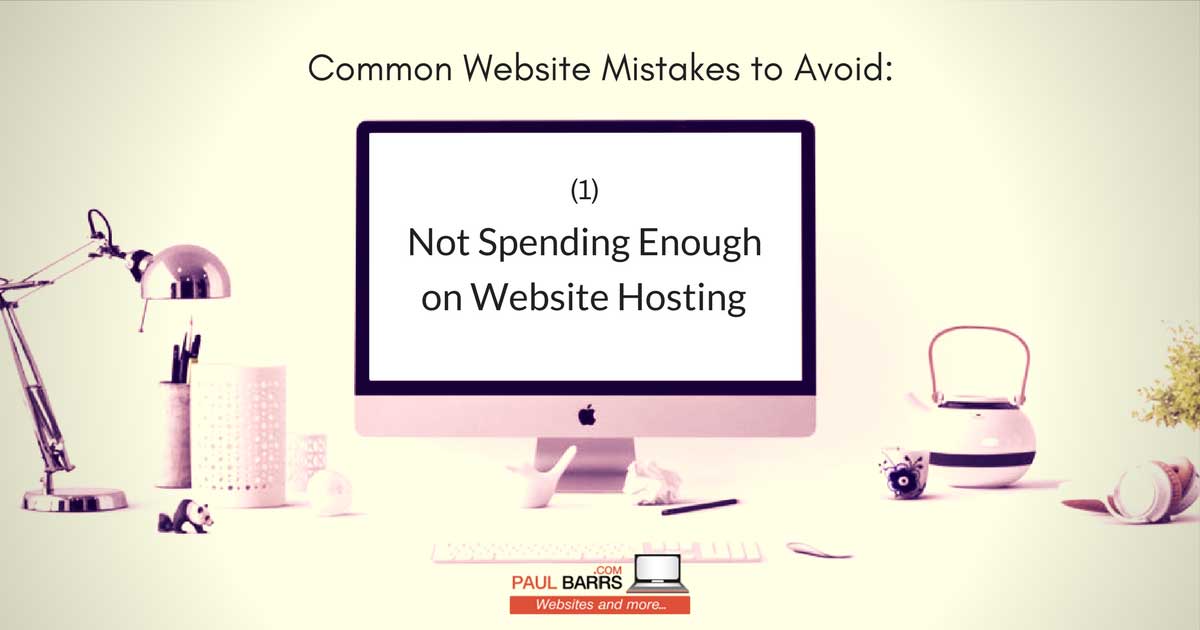
10 Oct Common Website Mistakes #1 – Not Spending Enough on Hosting
There are many common mistakes made by small business owners online. #1 is that they don’t spend enough on website hosting, usually opting for the cheapest available.
Hi there, folks. My name is Paul Barrs. Welcome to this new series, Simple Website Mistakes You Can Easily Avoid. Now, we’re going to do this the same as I have others in the past, a series of short videos allowing you to more easily take home and digest the information one by one.
So, let’s get started with number one on this list. And it’s an absolute crack-up, I see this all the time. It is simply, particularly in the small business sector spending more money on business cards than you do on your website host. Oh, my goodness. The number of people that I see who look for the quickest, easiest, cheapest option when it comes to website hosting, is astounding. And considering it really only costs $250, maybe $400, $500 to get a decent set of business cards, why won’t you spend less than that per year on your website hosting?
Your hosting is so important when it comes to the success of your website. You must as a small business, invest at least a reasonable amount of money. I mean, how much is reasonable? $250, $300 a year at least. I had someone come to me recently, “Paul, can you give us a competitive quote on our website hosting?” I said, “Sure. Here’s what I charge for small business hosting for a website like yours that uses that amount of bandwidth.” He went, “Oh, my goodness. I can get that for 10 bucks a month over at blah blah blah.” Well I said, “Good for you.”
I know the problems that you come across with these shared hosting accounts. Many business owners who will never go back, know the problems that come up with these shared hosting accounts. And I’m not going to go in and list them all, but they are simply this. If you have a problem, you’re toast. That’s pretty much what it comes down to. Now, I know, from time to time, there are exceptions, but I’m going to quote and talk about a story of a good friend of mine recently whose primary website got hacked on one of these shared hosting accounts.
Their primary website, their secondary website, their third, fourth, fifth and sixth website, all on the same hosting server, all got hacked. Why? Did someone go in there and actually target their websites? No. Somebody else got hacked and it carried over through the server to theirs. And I’ve seen this time and time again, where one element of a server gets hacked and it causes damage right across the board. And that’s just reason number one why you shouldn’t be using that kind of shared hosting.
Another is the load speed. The actual server itself, and this is a tricky one. Yes, it also depends on your website and your pages’ load time speed, but the server plays a large part in that. Last year, I finally took and bit the bullet, upgraded to a VPS, a Virtual Private Server, just for my clients. My clients and my clients only. And I found really soon, first time I’ve been running my own hosting server, you got to spend a bit of money in my position to get the speed of that thing up. So, I doubled, eventually tripled its speed as a server, not technically minded, I had to get someone to do this for me and it made the difference for my clients.
I also know from my security point of view. And we still only charge the same as we did beforehand, but it gives my clients better security, better speed, and better reliability. If they’ve got a problem, they come to me. If I’ve got a problem, I go directly to the people who are managing this server, who I pay a good amount of money every month to make sure that I have 24/7 support instant within usually 60 minutes, I get a response back often less.
Folks, it’s a simple truth. If you’re running a small business, you absolutely do not want to spend less money on your hosting provider than you do on your business cards, or rather marketing mediums. It’s that simple. All right, that’s number one in this series, we’ll continue on the next video. My name is Paul Barrs, thanks for listening, signing off, I’ll talk to you next time. Bye-bye.


